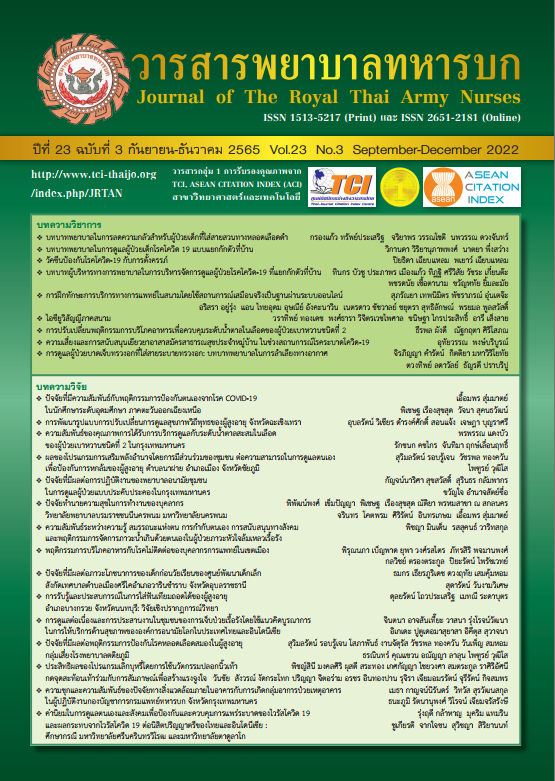The Effects of Health Literacy Program on Covid-19 Prevention Behaviors Type 2 Diabetes Mellitus Patients
Keywords:
Health Literacy, COVID-19 Prevention Behaviors, type 2 Diabetes mellitusAbstract
This research was quasi-experimental research. The purpose of this research was to study the effect of a health literacy program on COVID-19 prevention behaviors. The sample consisted of type 2 diabetic patients. The sample was selected by purposive sampling. They were divided into an experimental and a control group. Each group was divided into 34 people. The experimental group received a health literacy program for 4 weeks and the control group received normal nursing care. The instruments used for data collection were a health literacy program and COVID-19 prevention behaviors questionnaire. These instruments had been examined by three experts. Data were analyzed using percentage, mean, standard deviation, paired t-test., and independent t-test.
The results of the study found that after receiving a health literacy program on COVID-19 prevention behaviors, The experimental group had higher mean on health literacy and COVID-19 prevention behaviors scores than before receiving the program and more than the control group at a statistically significant (p< .05). Therefore, this program should be implemented to promote the prevention of COVID-19 or emerging disease in other patient populations, which may be applied to the context of each area.
Downloads
References
Emergency Operations Center, Department of disease control, Ministry of Public Health. Coronavirus disease situation report. Bangkok: Emergency Operations Center, Department of disease control; 2022. (in Thai)
Roncon L., Zuin M., Rigatelli G., Zuliani G. Diabetic patients with COVID-19 infection are at higher risk of ICU admission and poor short-term outcome. J Clin Virol. 2020; 127:04354.
Faghir-Gangi M., Moameri H., Abdolmohamadi N., Nematollahi S. The Prevalence of type 2 diabetes in patients with COVID-19: a systematic review and meta-analysis. Via Medica Journals. 2020; 9(5):271-278.
International Diabetes Federation. IDF Diabetes Atlas 10th edition. 2021.
Ministry of Public Health Bureau of noncommunicable disease. Annual Report 2016- 2018. 2019. (in Thai)
Nutbeam D. The evolving concept of health literacy. Social Science & Medicine. 2008; 67(12):2072-78.
Health Education Division. Health Literacy. (3rded). Nonthaburi. The agricultural Co-operative Federation of Thailand;2013. (in Thai)
Choojai R., Boonsiri Ch., Patcheep K. Effects of a health literacy enhancement program for COVID-19 prevention on health literacy and prevention behavior of COVID-19 among village health volunteers in Don tako sub-district, mueang district, Ratchaburi province. The southern college network journal of nursing and public health. 2021;8(1): 250-62. (in Thai)
Thianthavorn V., Chittiang N. Relationship between health literacy and behaviors to prevent COVID-19 among university student. Thai journal of public health and health sciences. 2021; 4(2): 126-37. (in Thai)
Klarob R., Sikaow O., Prasertsong C. The effect of health literacy program for uncontrolled type2 diabetes mellitus patients. Journal of the Royal Thai Army Nurses. 2021;22(3): 274-83. (in Thai)
Health Education Division. The Assessment of health literacy and health behaviors according 3aor2sor people aged 15 year and over. 2018.
Health Education Division. The Assessment of health literacy and health behaviors for prevention infectious disease and noninfectious disease are important people workingage.2022.
Intarakamhang U. Creating and developing of Thailand health literacy scales. bangkok: Health Education Division; 2021. (in Thai)
Rattanawarang R., Chantha W. Health literacy of selfcare behaviors for blood glucose control in patient with type2 diabetes. Thai journal boromarajonani college of nursing, Nakhonratchasima. 2018;24(2) :34-51. (in Thai)
Sookpool U., Kingmala C., Phaengsuk P., Yuenyao T., Wongwangman W. Effects of Health Literacy and Health Behavior Development Program for Working People. Journal of Public Health. 2020;29 (3):419-29. (in Thai)
Public administration in emergency situation, B.E.2021.Government GazetteVol.138, Sect. 133. (in Thai)
Downloads
Published
How to Cite
Issue
Section
License
Copyright (c) 2023 Journal of The Royal Thai Army Nurses

This work is licensed under a Creative Commons Attribution-NonCommercial-NoDerivatives 4.0 International License.
บทความหรือข้อคิดเห็นใดใดที่ปรากฏในวารสารพยาบาลทหารบกเป็นวรรณกรรมของผู้เขียน ซึ่งบรรณาธิการหรือสมาคมพยาบาลทหารบก ไม่จำเป็นต้องเห็นด้วย
บทความที่ได้รับการตีพิมพ์เป็นลิขสิทธิ์ของวารสารพยาบาลทหารบก
The ideas and opinions expressed in the Journal of The Royal Thai Army Nurses are those of the authors and not necessarily those
of the editor or Royal Thai Army Nurses Association.






